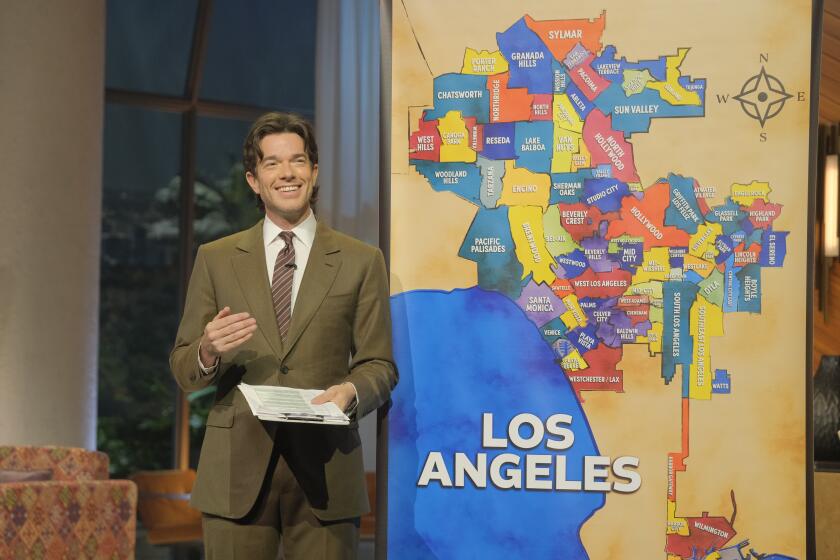It’s a Big Universe Out There for the Small Screen to Explore
It’s those nerdy guys building spaceship models. It’s the weirdos in the Klingon get-ups. Science fiction is a cult. An obsession. Something you outgrow.
So why are science-fiction films such as “Star Wars” and “E.T. the Extraterrestrial” among the highest-grossing movies of all time, with others such as “2001: A Space Odyssey” among the most acclaimed ever? Why does virtually everybody know all about Kirk and Spock and phasers and “Danger! Danger, Will Robinson!” Why has “Star Trek” in all its incarnations grossed an estimated $8 billion?
Because science fiction--sci-fi to say it quicker or to disdain the style (devotees prefer “sf”)--is a fertile form of storytelling that offers unlimited possibilities, fresh insight into ourselves and a lot of just plain fun. It’s technology, toys and titillation, sure. But it’s also provocative thinking, about who we are and how we live. All of which makes it one of entertainment’s hottest genres.
“Science fiction’s time has come,” says Bonnie Hammer, general manager of cable’s Sci Fi channel, whose audience has grown 50% in the last year with an ambitious slate of original dramas beamed to 60 million homes. “We’re living a life right now where we communicate via cyberspace with each other, we’re walking around with cell phones, some of us are sending faxes from our cars. It’s our belief that everyone is somehow connected to science fiction every day in our lives today. It’s become a way of life.”
So much so that defining sci-fi isn’t as simple as it once was, when creature features and space romps entertained us on an often childlike level. The adult aspects behind the first acknowledged science-fiction story, 1818’s “Frankenstein,” blossomed in the 1950s in reaction to the atomic bomb and electronic modernity. Sci-fi provided powerful allegory about the forces shaping our world in movies such as “Invasion of the Body Snatchers” and TV’s “Twilight Zone.” Baby boomers flocked to NBC’s 1960s series “Star Trek,” its space-western swagger and space-age technology enriched by light humor and moral parables. “Trek” helped broaden the genre, moving it into the mainstream.
Now at Sci Fi, says Hammer, “the way we look at science fiction is anything outside that which we know to be true. A movie like ‘Big’ or ‘Field of Dreams’ is absolutely science fiction.”
And Sci Fi, for the first time since its 1992 launch, is poised to truly explore that wide-open field. The channel has been remaking itself over the last two years since ex-Fox Chairman Barry Diller bought its USA Cable parent company. Sci Fi has changed its look and attitude to be “fun and light and approachable,” says Hammer, “as opposed to the darker, more gothic image.”
Observes Sandy Van Densen, who runs the scifiGATE.com fan site, “I think in the last year it has improved significantly.”
Gone are the prime-time repeats of old monster movies, replaced mostly in off hours by recent films, including, yes, “Field of Dreams.” Also downplayed are cartoony tube adventures appealing to kids. Even “Star Trek” was pushed to daytime, freeing prime time for fresher acquisitions such as “Xena” (Tuesday nights) and “Tales From the Crypt” (Wednesdays).
Wittier, more lavish original productions have replaced a slate once filled with space documentaries and two-bit action series. In spinning Sci Fi off from the USA mother ship, Diller and his network’s president, Stephen Chao, created the channel’s own development department. Its original programming budget increased 30% last year and climbed another 85% this year.
Friday night became all-original a year ago with several high-profile adventures. Acclaimed filmmaker Francis Ford Coppola was behind “First Wave,” in which gorgeous aliens invade Earth according to a Nostradamus prophecy of human-masquerade infiltration, with only two on-the-run Earthlings aware of their scheme. It’s melodramatic and serious.
Conversely, light and lively action is the appeal of “Farscape” (Fridays at 8 p.m.), now in its second season. It’s a humor-filled space opera in which assorted ragtag aliens and one lost American rocket jock wander unexplored galaxies in a living ship, evil commandos in hot pursuit. With the Jim Henson Co. as one of its producers, “Farscape” employs puppet-animation technology alongside its human cast to create alien creatures both wacky and worldly.
Human hero John Crichton (Ben Browder) has dash and panache--as does his robust female alien friend, Aeryn Sun (Claudia Black)--and he never takes his marooned condition too seriously. The show takes place in current time, which means Crichton can observe, “This looks like an episode of ‘Melrose Place’ “--on which Browder appeared. Crichton is one of us.
Which nobody on “Lexx: The Series” (Fridays at 10 p.m.) is. A polarizing sensation since its January debut, this Canadian-German acquisition also throws together various life forms on a sentient ship, but with campy appeal and sex, sex, sex. At the center is a mixed-breed “curvaceous one” whose love-slave programming has her on the prowl for “studly guys.” With her are a bumbling human captain, a long-dead reanimated assassin and a bodyless robot head with the hots. “Lexx” leans toward the grotesque in its interplanetary adventures, which unfold with the play-acting unreality of old British sci-fi shows.
Adding to the Friday mix is “Good Vs. Evil” (at 9 p.m.), formerly USA’s “GvsE,” a Quentin Tarantino-esque romp in which two “lost angels” working for “The Big Girl upstairs” hunt demons in L.A. Coming in June is a new “Invisible Man” series, starring Vincent Ventresca (“Boston Common”) as an irreverent thief drafted for government invisibility experiments. (“First Wave” has shifted to 7 p.m. Sunday, a night that may be the second originals beachhead.)
That doesn’t mean good old space action is on the way out. Sci Fi has two big “event” productions in the works: “Frank Herbert’s Dune,” a six-hour miniseries being filmed in Prague by cinematographer Vittorio Storaro (“Apocalypse Now”), and the 20-hour Steven Spielberg epic “Taken,” about alien abductions.
But Sci Fi’s biggest challenge is reaching beyond the core of fans already primed for such shows. When Hammer came to Sci Fi after a decade at USA, where she helped build the World Wrestling Federation franchise, she wanted to “give it a brand, an on-air look.” The channel’s Saturn-planet logo became more sleek, its promos zippier. The “I Am Sci Fi” campaign features “people you would never associate with science fiction,” Hammer boasts: rocker Moby, wrestler Sable, rappers Busta Rhymes and Queen Latifah, martial arts star Jet Li, athletes Kevin Garnett and Venus and Serena Williams, and virtual video gamer Lara Croft.
It’s an interesting group--mostly female, many black or Asian, contrary to the persistent sci-fi stereotype of geeky white guys who can’t get a date. Genre fan sites (scifiGATE.com and the11thhour.com) are operated by women, and there’s one running the Sci Fi channel.
Come to think of it, a woman invented the genre: Mary Shelley, who wrote “Frankenstein.” The stereotypes didn’t apply then. And they sure don’t now.
The complete guide to home viewing
Get Screen Gab for everything about the TV shows and streaming movies everyone’s talking about.
You may occasionally receive promotional content from the Los Angeles Times.



